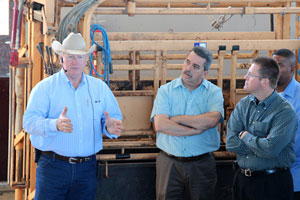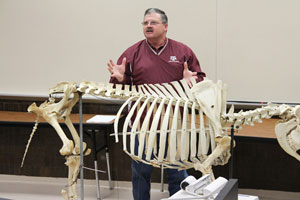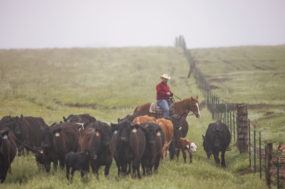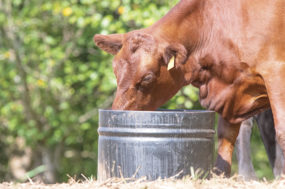"Beef Boot Camp - Retail: Learning Production...Telling the Story" teaches meat market managers how beef is produced and arms them with the science-based knowledge they need to answer consumer questions.
Dr. Rick Machen, professor and Extension specialist, conceptualized the two-day course to help clear up some common consumer confusion and misconceptions engaging meat market managers as “volunteer” educators.
"Consumer interest in 'other than traditionally produced' beef is on the rise, due in a large part to their misunderstanding of traditional beef production and the nutrition, safety and wholesomeness of traditionally produced beef," Machen said. "Much confusion exits among consumers as to the true definition of and specifications for natural, grass-fed and organic beef and how these products compare to traditionally produced beef.
"Who is always on the front line every day when it comes to interaction with beef consumers? Meat market personnel in retail grocery stores," Machen explains.
With the help of his Extension peers in the department of animal science and in partnership with the Texas Beef Council, Machen put together a program that covered topics including a beef industry overview, pre-harvest production systems, live cattle evaluation, harvest and product handling, carcass evaluation and a sensory discussion.
 More specifically, on day one of the Beef Boot Camp - Retail, Machen described the amazing ruminant and discussed the pre- harvest production systems for natural, grass-fed and organic beef and led a fact versus fiction question and answer session. Dr. Jason Cleere, associate professor and beef cattle extension specialist, described the different breed types and their adaptability, and Dr. Ron Gill, professor and associate head for extension, described the industry segments including cow-calf, stocker and feedlot operations, gave an overview of marketing, and discussed the differences between beef production and the vertically-integrated pork and poultry industries.
More specifically, on day one of the Beef Boot Camp - Retail, Machen described the amazing ruminant and discussed the pre- harvest production systems for natural, grass-fed and organic beef and led a fact versus fiction question and answer session. Dr. Jason Cleere, associate professor and beef cattle extension specialist, described the different breed types and their adaptability, and Dr. Ron Gill, professor and associate head for extension, described the industry segments including cow-calf, stocker and feedlot operations, gave an overview of marketing, and discussed the differences between beef production and the vertically-integrated pork and poultry industries.
In addition, Cleere explained how to identify superior traits and then led the group through an interactive live animal evaluation. Also, Gill demonstrated low stress cattle handling and concluded with a discussion on animal welfare and pre-harvest safety interventions.
On the second day of the program, extension meat specialists Drs. Dan Hale, professor, and Davey Griffin, associate professor, and Ray Riley, manager of the Rosenthal Meat Science and Technology Center, explained beef harvesting/processing including day 0 (harvest), day 2 (cut), day 5 (ship), and day 28 (portion control cutting). During the carcass evaluation segment, the trio explained how to identify meat cuts and where they come from, and to conclude the day, they led a sensory discussion involving beef products from the Kroger meat case.
Aaron Stryk works as the southwest division meat and sea- food merchandiser at the Kroger southwest division office in The Woodlands. He’s been with Kroger for 14 years and said customers today are more health conscious and perceive a benefit in purchasing items that are all natural, organic or grass-fed even if they cost a little more.
“Most of the questions we get revolve around animal diets and availability of the products. The boot camp presented an opportunity for Kroger to provide additional training and develop- ment for our market managers and meat staff,” Stryk said. “The knowledge and better understanding gained about the differences between Angus, organic, all natural and grass-fed along with the sensory discussion and exercise on the different tastes of each kind of beef will be most useful for our associates to answer these questions.”
 Stryk added that through partnering with Texas A&M AgriLife Extension Service and program sponsors Texas Beef Council and Nolan Ryan Beef, they have gained credibility with their associates, which in turn benefits the consumer.
Stryk added that through partnering with Texas A&M AgriLife Extension Service and program sponsors Texas Beef Council and Nolan Ryan Beef, they have gained credibility with their associates, which in turn benefits the consumer.
“This program satisfies an educational need we’ve had for a long time. Our market managers and associates appreciate the investment we are making in them through continuous education. It helps with our employee morale and their engagement with our customers,” he said.
Glenn Osborne, Kroger meat market manager, attended the boot camp in September and said the camp has changed his view on how the industry operates.
“I have not been involved with the raising of these animals, therefore I was unaware of the amount of science used to raise them,” Osborne said. “There has been a tremendous amount of “bad” information told to our consumers, which is honestly due to the lack of knowledge being relayed back to the public. I hope to inform my associates and our customers about some of the positive aspects of our industry.”
Approximately 100 Kroger market managers have been trained through the six courses held thus far, with five more cours- es on the schedule for 2013. On average, more than 2,000 customers pass through every Kroger market daily.
Machen has been pleased with the success of the program and is looking into working with other food retailers in Texas and expanding the reach of this first-of-its-kind program.
“Extension is all about education – interpreting and conveying peer-reviewed science-based information to our clientele. Unfortunately, when it comes to food (produce, meat, eggs, dairy products, nuts, peanut butter, bread, chips, etc.) consumers are bombarded with much misinformation,” Machen said.
“U.S. food producers provide the safest, most wholesome, most affordable and most abundant food in the history of man. Agriculture needs all the help we can muster to tell this story – these meat market managers leave Boot Camp excited about beef and their opportunities to tell its story,” Machen said. ![]()
Courtney Coufal is a communications coordinator for the Texas A&M Univesity Department of Animal Science. This originally appeared in the Animal Science Monthly.
PHOTOS
TOP RIGHT: Dan Hale, associated professor and extension meat specialist, discusses yield and quality grades of the carcasses with a group of market managers from the Dallas area. Photo courtesy of Texas A&M.
MIDDLE RIGHT: Ron Gill, associate head for Texas A&M extension, discusses Beef Quality Assurance production practices used on ranches to ensure beef supplied to stores is safe and wholesome. Photo courtesy of Texas A&M.
BOTTOM RIGHT: Davey Griffin, associate professor and extension meat specialist uses a cow skeleton to show where meat cuts come from. Photo courtesy of Texas A&M.








